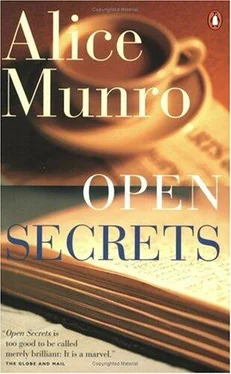The hall filled up with the smell of shaving soap, paste deodorant, and a cheap drugstore cologne. Lily of the Valley. And now Maureen recognized them.
It was Marian Hubbert. Only, she looked different in a blue suit — which was too heavy for this weather — and her brown cloth gloves, and a brown hat made of feathers. Usually you saw her in town wearing slacks or even what looked like men’s work pants. She was a husky woman of about Maureen’s age — they had been in high school together, though a year or two apart. Marian’s body was clumsy but quick, and her graying hair was cut short, so that bristles showed on her neck. She had a loud voice, most of the time a rather rambunctious manner. She was toned down now.
The man with her was the man she had married not so long ago. Maybe a couple of years ago. He was tall and boyish-looking, in a cheap, cream-colored jacket with too much padding in the shoulders. Wavy brown hair, fixed with a wet comb. “Excuse us,” he said in a soft voice — perhaps one that his wife was not intended to hear — as Maureen took them into the dining room. Close up, his eyes were not so young — there was a look of strain and dryness, or bewilderment. Perhaps he was not very bright. Maureen remembered now some story about Marian’s getting him from an advertisement. Woman with farm, clear title. Businesswoman with farm , it could have been, for Marian Hubbert’s other name was the Corset Lady. For years and years she had sold made-to-measure corsets and perhaps she still did, to the dwindling number of ladies who wore them. Maureen imagined her taking measurements, prodding like a nurse, bossy and professionally insulting. But she had been kind to her old parents, who lived out on the farm until they were a great age and had any number of things wrong with them. And now another story surfaced, a less malicious one, about her husband. He had driven the bus that took old folks to their therapeutic swimming session, at Walley, in the indoor pool — that was how they had met. Maureen had another picture of him, too — carrying the old father in his arms, into Dr. Sands’ office. Marian charging ahead, swinging her purse by its strap, ready to open the door.
She went to tell Frances about breakfast in the dining room, and to ask her to bring extra coffee cups. Then she went to warn her husband.
“It’s Marian Hubbert, or she used to be,” she said. “And whatever that man’s name is that she’s married to.”
“Slater,” her husband said, the way he would dryly bring forth the particulars of a sale or lease that you wouldn’t have thought he could know so readily. “Theo.”
“You’re more up-to-date than I am,” Maureen said.
He asked if his porridge was ready. “Eat and listen,” he said.
Frances brought in the porridge, and he fell to at once. Slathered with cream and brown sugar, porridge was his favorite food, winter and summer.
When she brought the coffee, Frances tried to hang about, but Marian gave her a steady look that turned her back to the kitchen.
There, thought Maureen. She can manage better than I can.
Marian Hubbert was a woman without one visible advantage. She had a heavy face, a droop to the cheeks — she reminded Maureen of some sort of dog. Not necessarily an ugly dog. Not an ugly face, really. Just a heavy and determined one. But everywhere Marian went, as now in Maureen’s dining room, she would present herself as if she had absolute rights. She had to be taken account of.
She had put on a quantity of makeup, and perhaps that was another reason Maureen hadn’t immediately recognized her. It was pale and pinkish and unsuited to her olive skin, her black, heavy eyebrows. It made her look odd but not pathetic. It seemed she might have put it on, like the suit and hat, to demonstrate that she could get herself up the way other women did, she knew what was expected. But perhaps she intended to look pretty. Perhaps she saw herself transformed by the pale powder that was hanging on her cheeks, the thick pink lipstick — perhaps she turned when she finished and coyly showed herself to her husband. Answering for his wife in regard to sugar for her coffee, he almost giggled when he said lumps .
He said please and thank you as often as possible. He said, “Thank you very much, please. Thank you. The same for me. Thank you.”
“Now, we didn’t know anything about this girl until after it seems like everybody else knew,” Marian was saying. “I mean, we didn’t even know anybody was missing or anything. Not until yesterday when we came into town. Yesterday? Monday? Yesterday was Monday. I have got my days all mixed up, because I’ve been taking painkiller pills.”
Marian was not the sort to tell you she had been taking pills and let it go at that. She would tell you what for.
“So I had a terrible big boil on my neck, right there?” She said. She scrunched her head around, trying to show them the dressing on it. “It was giving me pain and I started getting a headache, too, and I think it was something connected. So I was feeling so bad on Sunday I just took a hot cloth and put it to my neck and I swallowed a couple of painkillers and I went and laid down. He was off work that day, but now he’s working he’s always got lots to do when he’s home. He’s working at the Atomic Energy.”
“Douglas Point?” said Lawyer Stephens, with a brief look up from his porridge. There was a certain interest or respect all men showed — even Lawyer Stephens had to show it — at the mention of the new Atomic Energy Station at Douglas Point.
“That’s where he works now,” Marian said. Like many country women and Carstairs women, too, she referred to her husband as he —it was spoken with a special emphasis — rather than calling him by his name. Maureen had caught herself doing it a few times, but had corrected the habit without anybody’s having to point it out to her.
“He had to take the salt out for the cows,” Marian said, “and then he went back and worked on the fence. He had to go quarter of a mile, maybe, so he took the truck. But he left Bounder. He went off in the truck without him. Bounder our dog. Bounder won’t go any distance unless that he can ride. He left him on guard sort of because he knew I had went and laid down. I had taken a couple of 222s, and I went into a kind of doze more than a regular sleep, and then I heard Bounder barking. It woke me right up. Bounder barking.”
She got up then, and she put on her wrapper and went downstairs. She had been lying down just in her underclothing. She looked out the front door, out the lane, and there was nobody. She didn’t see Bounder, either, and by that time he had quit his barking. He quit when it was somebody he recognized. Or somebody just going by on the road. But still she wasn’t satisfied. She looked out the kitchen windows, which gave on the side yard but not the back. Still nobody. She couldn’t see the backyard from the kitchen — to do that, you had to go right out through what they called the back kitchen. It was just a sort of catchall room, like a shed tacked onto the house, all jumbled up with everything. It had a window looking out back, but you couldn’t get near that or see out of it because of cardboard boxes piled up and the old couch springs standing on end. You had to go right and open the back door to see out. And now she thought she could hear something at that door like a kind of clawing. Maybe Bounder. Maybe not.
It was so hot in that shut-up back kitchen packed with junk that she could barely breathe. Under her wrapper she was all sticky with sweat. She said to herself, Well, at least you haven’t got a fever, you are sweating like a pig.
She was more interested in getting air to breathe than she was scared of what might be out there, so she thrust the door open. It opened outward, pushing the fellow back that was up against it. He staggered back but didn’t fall. And she saw who it was. Mr. Siddicup, from town.
Читать дальше












